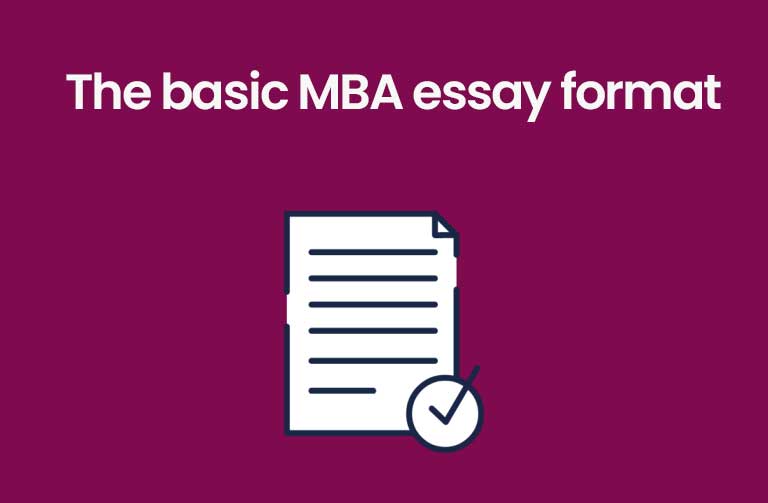An impressive MBA essay is a crucial part of your business school application. It is an opportunity for you to highlight your unique qualities, experiences, and aspirations. Mastering the art of MBA essay writing not only helps in securing admission to your dream school but also lays a robust foundation for your future career path.
To help you surmount this challenge, we’ve curated the seven best and most practical MBA essay writing tips to craft unique MBA essays that truly stand out:
1. Start early and familiarize yourself with the basics of essay writing.

Some of the basics of MBA essay writing are:
a) Answer the essay question. This seems like a no-brainer, but many candidates write beautiful essays that do not answer the essay question. In your desire to impress, it’s easy to divert from the main topic or to overcomplicate your response.
Keep the question in focus, structure your essay around your answer, and ensure your narrative directly relates to it, reinforcing your points with relevant examples.
b) Write authentically. Do not write what you think admissions committee members want to read. It’s crucial to stay genuine and true to your experiences and perspectives.
The best essays are those that reflect your unique journey, demonstrating your personal growth, character, and future aspirations. Let your authenticity shine through your narrative, making it resonate on a personal level with the readers.
c) Look at the application comprehensively. Remember, essays are just one part of the overall MBA application. They should be consistent with the rest of your application elements, such as your CV, letters of recommendation, and interview.
Each part of your application should complement and enhance the others, providing a holistic image of your candidacy. Hence, approach your application as a cohesive package rather than isolated components.
d) Keep your language approachable and limit flowery prose. While it’s tempting to impress with complex vocabulary and elaborate sentences, clarity and simplicity are key. Your readers should be able to understand your point easily.
Avoid jargon and unnecessary verbosity, focusing instead on conveying your message clearly and directly. Remember, your goal is to communicate effectively, not to showcase a thesaurus.
e) Gain familiarity with the basic format: introduction, body paragraphs, and conclusion. Understanding this foundational structure is vital for crafting an organised and focused essay.
- Your introduction should engage the reader and provide a brief overview of your essay’s content.
- The body paragraphs should elaborate on your main points, providing relevant examples and experiences.
- Finally, your conclusion should succinctly summarise your points and leave the reader with a clear understanding of your perspective or message.
2. Use a 3-part structure and communicate your proactive and leadership qualities.

The 3-part structure that’s popularly used in MBA essays is the Introduction, Body Paragraphs, and Conclusion – as mentioned above.
5 tips to write an effective introduction for an MBA essay are:
- Be school-specific. In your MBA essay, it’s crucial to be school-specific and demonstrate your passion for the particular MBA program you’re applying to. Delve into why the program aligns with your career goals, how the school’s culture resonates with you, and what unique contributions you can bring to their community.
- Write simply and engagingly. When crafting your MBA essay, aim for simplicity and engagement. Let the readers immerse themselves in a meaningful and compelling narrative about you. This is your chance to showcase not just your accomplishments but also your journey and personal growth.
- Hook your reader. Your first sentence plays a crucial role in setting the tone for the entire essay. Spend some time crafting an engaging hook that immediately piques the reader’s interest. Remember, an intriguing beginning is an essential MBA essay writing tip that can help your essay stand out.
- Avoid long, dense sentences. Start your MBA essay with something clear, concise, and catchy. It’s best to avoid overly complex sentences that might confuse the reader. Instead, aim for clarity and simplicity to spark your reader’s curiosity and keep them engaged.
- Avoid overly broad claims or plain statements of fact. A unique MBA essay is one that goes beyond generalisations and fact-stating. Be specific in your claims, provide evidence or examples, and focus on showcasing your unique experiences and perspectives. It’s about creating a personal and distinctive narrative that leaves a lasting impression.
5 tips to write impactful body content for an MBA essay are:
- Real-life examples in your MBA essay will breathe life into your narrative. By incorporating specific anecdotes and vivid details, you’ll create a compelling and authentic story that far surpasses general claims and broad summaries. This is one of the most useful MBA essay writing tips that will help you craft a unique MBA essay.
- In the body paragraphs of your essay, detail is king. Supporting your thesis statement with pertinent facts and evidence deepens the narrative and fortifies your arguments. Remember, a unique MBA essay is one that provides comprehensive, substantiated information and not mere assertions.
- In your MBA essay, it’s vital to portray yourself as a proactive individual, someone who takes the initiative and gets things done. Business schools are in the hunt for leaders, not followers. Through examples and anecdotes, convey your can-do spirit and leadership potential.
- Remember to tailor your essay to each school by communicating specific reasons why you’re a perfect fit for their program. Research the school’s culture, courses, and values, and weave these elements into your narrative. It’s about crafting a unique MBA essay that demonstrates your synergy with the school.
- If your journey to business school has been unorthodox, don’t shy away from it in your MBA essay. Instead, highlight it. Admissions officers appreciate risk-takers who veer off the beaten path. Your unconventional experiences could very well be the key to crafting a truly unique MBA essay.
5 tips to write an unforgettable conclusion for an MBA essay are:

- Synthesize, don’t just summarize: In your MBA essay, the conclusion should not merely repeat your story but integrate all elements in a meaningful way, implying growth or future prospects. Use this section to reflect on your journey and provide insights into your evolving vision.
- Talk about your vision: A unique MBA essay is one that paints a picture of your future aspirations. Discuss how the MBA program aligns with your vision, how it will help you achieve your goals, and the impact you intend to make in your chosen field.
- Discuss the MBA program you’re applying to: A critical MBA essay writing tip is to demonstrate your understanding and enthusiasm for the specific MBA program you’re applying to. Highlight the aspects of the program that appeal to you and how they tie into your career objectives.
- Paraphrase and be concise: Your concluding paragraphs should succinctly sum up the main points of your essay without redundancy. Paraphrase the key ideas you have discussed and present them in a compact, easily digestible format.
- Tie your conclusion to your introduction: A unique MBA essay creates a sense of full circle by tying the conclusion back to the points raised in the introduction. This not only provides a neat structure to the essay but also enhances the cohesiveness and impact of the narrative.
To communicate your proactive and leadership qualities in an MBA essay, you can provide specific examples of situations where you have demonstrated these qualities. For instance, you can talk about a time when you took the initiative to start a new project or solve a problem.
You can also discuss how you have motivated and inspired others to achieve a common goal. It’s important to be specific and provide concrete examples to illustrate your points.
3. Communicate specific reasons why you’re a great fit for each school.
Some of the reasons you may mention why you are a great fit for a business school are:
a) Your academic and professional background: Highlighting your past achievements, including academic laurels, professional accomplishments, and skills, can illustrate your readiness for the MBA program. Mention how these experiences align with the program’s focus, preparing you for the rigour and enriching your perspective to contribute to classroom discussions.
b) Your career goals: Articulate your short-term and long-term career aspirations clearly. Discuss how the specific MBA program can act as a catalyst in achieving these goals. Be specific about the resources and opportunities offered by the program and how they align with your career roadmap.
c) Your personal qualities: Reflect on your personal attributes, such as leadership, teamwork, problem-solving ability, and communication skills. Providing real-life examples where these qualities were evident can make your narrative compelling and authentic, demonstrating your potential value to the business school.
d) Your fit with the school’s culture and values: Understand the school’s mission, values, and culture, and illustrate how these resonate with your own principles. Sharing experiences or beliefs that mirror the school’s ethos can strengthen your candidacy by showing your fit with the school’s community.
e) Your contributions to the school community: Speak about your potential contributions to the school community. Discuss your plans to participate in clubs, organisations, and events, bringing in unique perspectives and experiences. This shows your eagerness to engage with the community and contribute positively to the school’s environment.
4. Bring passion to your writing. Admissions officers want to know what excites you.

Some tips to make your MBA essay sound more exciting are:
- Use vivid language and sensory details: Use descriptive language and sensory details to paint a picture in the reader’s mind and make your essay more engaging.
- Tell a story: Use storytelling techniques to make your essay more interesting. Start with a hook to grab the reader’s attention, and use anecdotes and examples to illustrate your points.
- Show, don’t tell: Instead of simply stating your qualities or achievements, show them through specific examples and actions.
- Vary your sentence structure: Use a mix of short and long sentences, and vary your sentence structure to keep the reader engaged.
- Use an active voice: Use an active voice instead of a passive voice to make your writing more dynamic and engaging.
Remember to stay focused on the essay prompt and communicate your main points clearly. An exciting essay is one that is well-written, engaging, and effectively conveys your message.
5. Break the mould. Challenge perceptions with unexpected essays that say, “There’s more to me than you think”.
Here are some tips on how to stand out from other applicants and demonstrate your unique qualities and experiences in an MBA essay:
- Share a unique perspective or experience: Share a story or experience that is unique to you and demonstrates your individuality.
- Take a creative approach: Use a creative format or structure for your essay, such as writing in the form of a letter or using a non-linear narrative.
- Show your personality: Let your personality shine through in your writing, and don’t be afraid to show your quirks and interests.
For example, if you have a unique hobby or passion, you could write about how it has shaped your perspective and influenced your career goals. Or, if you have overcome a significant challenge or adversity, you could share your story and demonstrate your resilience and determination.
6. Specific anecdotes and vivid details make a much greater impact than general claims and broad summaries.

Here are some examples of anecdotes you can use in your MBA essays:
- If you’re writing about a time when you demonstrated leadership, you could share a specific example of a project or initiative that you led, and describe the challenges you faced and how you overcame them.
- If you’re writing about a personal or professional failure, you could share a specific example of a time when things didn’t go as planned, and describe what you learned from the experience and how it helped you grow.
- If you’re writing about your career goals, you could share a specific example of a project or experience that inspired you to pursue a particular career path and describe how the MBA program will help you achieve your goals.
Remember to be specific and provide concrete details to illustrate your points. This will help the reader understand your experiences and motivations, and make your essay more engaging and memorable.
7. Demonstrate a sense of humour or vulnerability. You’re a real person, and it’s okay to show it!
Incorporating humour in an MBA essay can help lighten the mood and make your essay more engaging. Here are some tips and examples of how to incorporate humour in an MBA essay:
- Use a humorous anecdote: You could share a funny story or experience that illustrates your point and makes the reader smile.
- Use wordplay or puns: You could use wordplay or puns to add a touch of humour to your writing.
- Use irony or sarcasm: You could use irony or sarcasm to make a point in a humorous way.
For example, if you’re writing about a time when you faced a challenge, you could use humour to describe the situation, such as “I was about as prepared for that presentation as a snowman in the Sahara.”
Or, if you’re writing about a personal or professional failure, you could use humour to show that you’re able to laugh at yourself and learn from your mistakes, such as “I learned the hard way that ‘winging it’ is not a viable strategy for public speaking.”
Remember to use humour appropriately and in moderation. Humour can be a great way to engage the reader and make your essay more memorable, but it’s important to strike the right balance and not detract from the main message of your essay.
Similarly, you can show vulnerability in an MBA essay to help you connect with the reader and demonstrate your self-awareness and personal growth. Don’t forget to add what you learned from your challenges and used them as a stepladder to success.
In conclusion, writing an engaging and unique MBA essay is not just about showcasing your achievements and ambitions, but it’s about presenting an authentic narrative that reflects your journey, values, and personality. These seven practical tips provide a robust framework to help you create an MBA essay that stands out, resonates with the admission officers, and ultimately paves the way to your dream business school.





